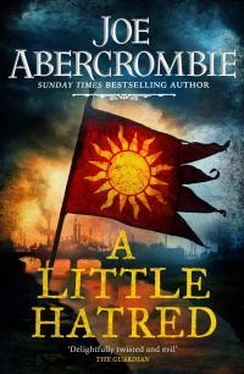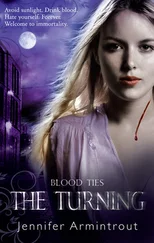‘I’m just trying to get from one day to the next,’ came Gunnar’s voice. ‘Trying to keep things together.’
Keeping things together was no easy task in Valbeck. The riots might mostly have stopped but the heat, and the anger, and the fear hung over the city thick as the vapours had when the furnaces were still lit. Fear of violence. Fear of hunger. Fear of what would happen when the authorities returned. Fear that they might not. Who was in charge depended on who you asked, which part of town you were in, whether it was day or night. If there was any plan in all this madness, all this destruction, Savine could not see it. No one was safe in Valbeck now. Perhaps no one ever truly was. Perhaps safety was a lie people told themselves so they could carry on.
She closed her eyes, and thought of the feeling as she stabbed that squinting man through the chest. As she ran the one with the cap through the back. A slight pressure in her palm. A slight tugging at the grip of the sword. So shockingly easy, to kill a man. She told herself they had given her no choice. And yet she saw their faces whenever she closed her eyes, and felt her breath coming fast, the sweat prickling, her heart thumping the way it had then, rubbing over and over at her itchy, greasy neck with her fingertips.
‘So you’re a Breaker now?’ came Liddy’s voice through the wall.
‘Malmer’s doing the best he can for folk so I’m doing the best I can for him. Stand on the barricades. Hand some food out. I’m not a soldier no more. I’m not a herder no more. What should I be?’
‘My husband. May’s father.’
‘I know. That’s all that matters, but … what should I do?’ It was strange to hear that wheedling, almost tearful note in the voice of a man Savine knew to be so very dangerous. ‘I can’t just sit and do nothing, can I, while people are getting hurt?’
There was no weakness in Liddy’s voice. Her strength amazed Savine, the way she kept going, working, smiling, making the best of this nightmare. ‘It’s a fine line, Gunnar, between helping people and hurting ’em. You’re prone to wander all over it.’
‘I’m trying to do the right thing, it’s just … the right thing ain’t always easy to know.’ And their voices dropped to a soft burble, lost as someone started shouting outside. A fight, maybe. Savine shrank back until it drifted off down the street and was gone.
She licked her lips as the silence pressed in on her. She did not want to speak. But it was better than seeing those faces again. ‘My parents used to argue, sometimes.’
May’s eyes met hers. ‘What about?’
‘My father’s work. My mother’s drinking. Me. I was always their favourite argument.’ Were they arguing about her even now? Savine looked down at the cheap boards, full of splits and splinters. It was better not to think about her old life. Better to pretend to be a new person, who belonged where she was. Who knew she was lucky to be here.
Liddy had given her a dress, if you could call it that. A shapeless bag of coarse cloth, carefully mended and smelling of cheap soap, and she was grateful for it. Gunnar had found her a mattress, or some scratchy sacking that the straw poked through. Savine had no doubt it swarmed with lice, and she was grateful for it. She shared a room with May no bigger than a cupboard in her house in Adua, with laths showing through the cracked plaster and a bloom of mould about the flaking window frame. She scarcely ever had a moment to herself, but she was grateful for that, too. When she was alone, the things she had seen and done the day of the uprising rushed into her mind, like filthy water into a holed boat, and dragged her down so quickly she felt she was drowning.
She had thought of trying to get out of the city, but the truth was she scarcely had the courage to look out of the window, let alone to risk the streets again. She found she had a great deal less courage altogether than she had smugly supposed while blackmailing investors, or choosing a wig, or pronouncing social death sentences in the salons of Adua. She had always reckoned herself such a gambler. No more audacious woman in the Union. Now she realised the games had always been rigged in her favour. She never had to gamble with her life before, and the stakes had risen suddenly far too high for her taste.
They had a candle the first few nights but now it was gone, and the only light came from distant fires, always burning somewhere in the city. Everything was running out. The shops had been looted, the rich houses stripped back to the rafters. The Breakers brought some food around, but every day there was less.
She had always known life was hard in these slums, but if she had thought about it at all, she had pictured a romantic version. A version that was easy to live with. Pretty children, giggling as they frolicked in the gutters. Old women cackling as they boiled bones in a pot. Strapping men slapping one another on the back, singing good old work songs in harmony as they sat around a fire made from their last sticks of furniture. Oh, the sisterhood, the spirit, the nobility of poverty!
It turned out there was nothing romantic about shitting in a bucket while someone else watched. Nothing spirited about hoarding the bones from the chicken for tomorrow’s dinner. Nothing sisterly about the women who tore at each other over scraps scavenged on the great rubbish heaps. Nothing noble in the cramps you got from rotten water at the pump, or the lice you picked from your armpits, or being endlessly cold, endlessly hungry, endlessly scared.
And yet living this way did not make Savine sorry for the people who were forced to do it every day. Who did it in the many buildings just like this one she profited from all across the Union. It only made her desperate never to live this way herself again. Perhaps that made her selfish. Wicked. Evil, even. While she fled whimpering through the city on the day of the uprising, she had sworn to a God she did not believe in that she would be good, if it meant she could live.
Now she was happy to be evil, if it meant she could be clean.
‘You were in Colonel Vallimir’s house,’ said May. Savine stared at her, caught off balance and failing to hide it, the constant nagging ache of fear turned suddenly, terribly sharp.
‘What?’ she croaked.
‘The night before the uprising.’ May could not have looked calmer. ‘I served you jelly.’
Savine’s eyes slunk to the door. But there was no way out of this room without going through the other. Where a man she had seen stomp another man’s head into the road was arguing with his wife. ‘Horrible jelly,’ she muttered.
‘I was trying to work out how much your dress cost,’ said May. Far more than this room. Probably more than this whole building. ‘Your hair was different.’ She glanced up at the mousy fuzz starting to grow back on Savine’s scalp. ‘A wig?’
‘Lots of us wear them. In Adua.’ So she knew who Savine was. She had always known. But she had not told. Savine took a deep breath, trying not to let the fear show. Trying to think. The way she used to in a meeting with partners. A negotiation with rivals.
May nodded slowly. As if she guessed Savine’s thoughts. ‘Beautiful dresses. Horrible jellies. Different world, isn’t it? You asked me what I thought about the city.’
‘You were … very honest.’
‘Little too honest for my own good, I expect. Always been a problem of mine. You stood up for me, though. I listened at the keyhole, and you stood up for me.’
Savine cleared her throat. ‘Is that why you took me in?’
‘Wish I could say yes.’ May sat forward, thin hands dangling over her knees. ‘But that wouldn’t be entirely honest. Fact is, Vallimir’s whole house was buzzing with news of your visit. Everyone desperate to get a look at you. I know who you are, my lady.’
Читать дальше












